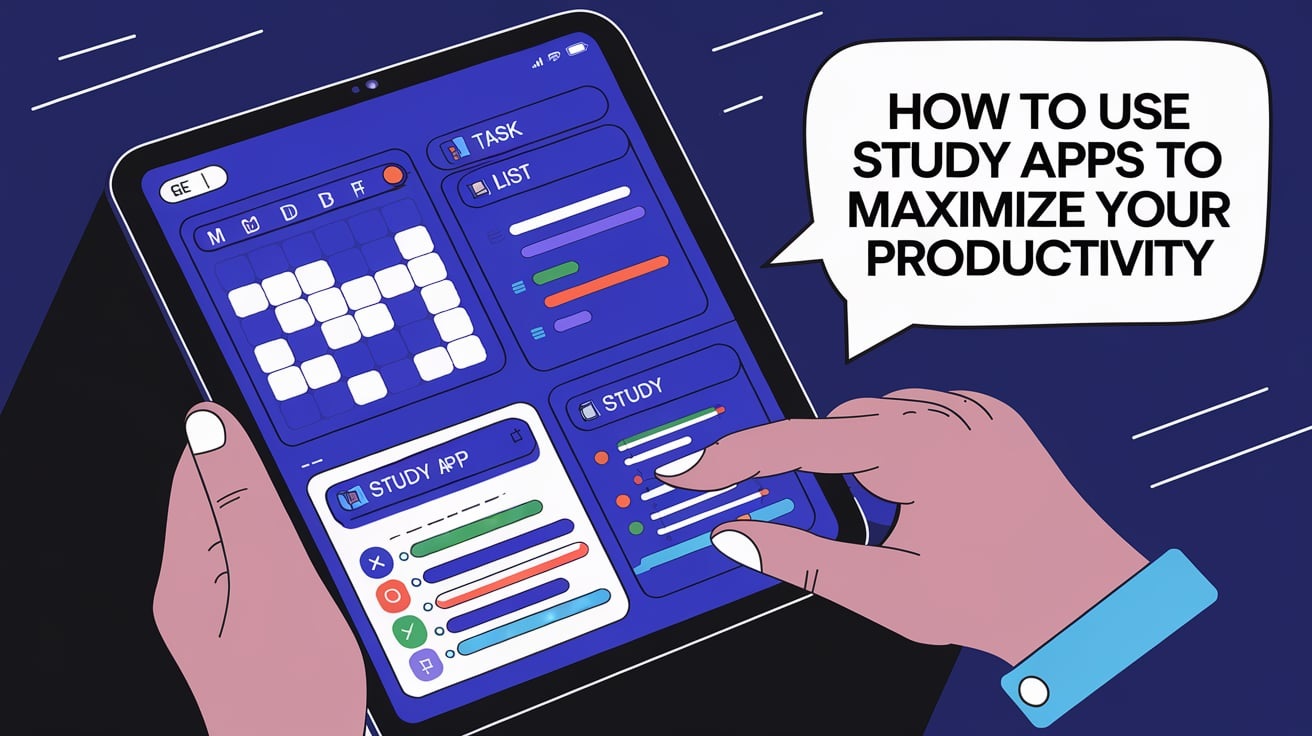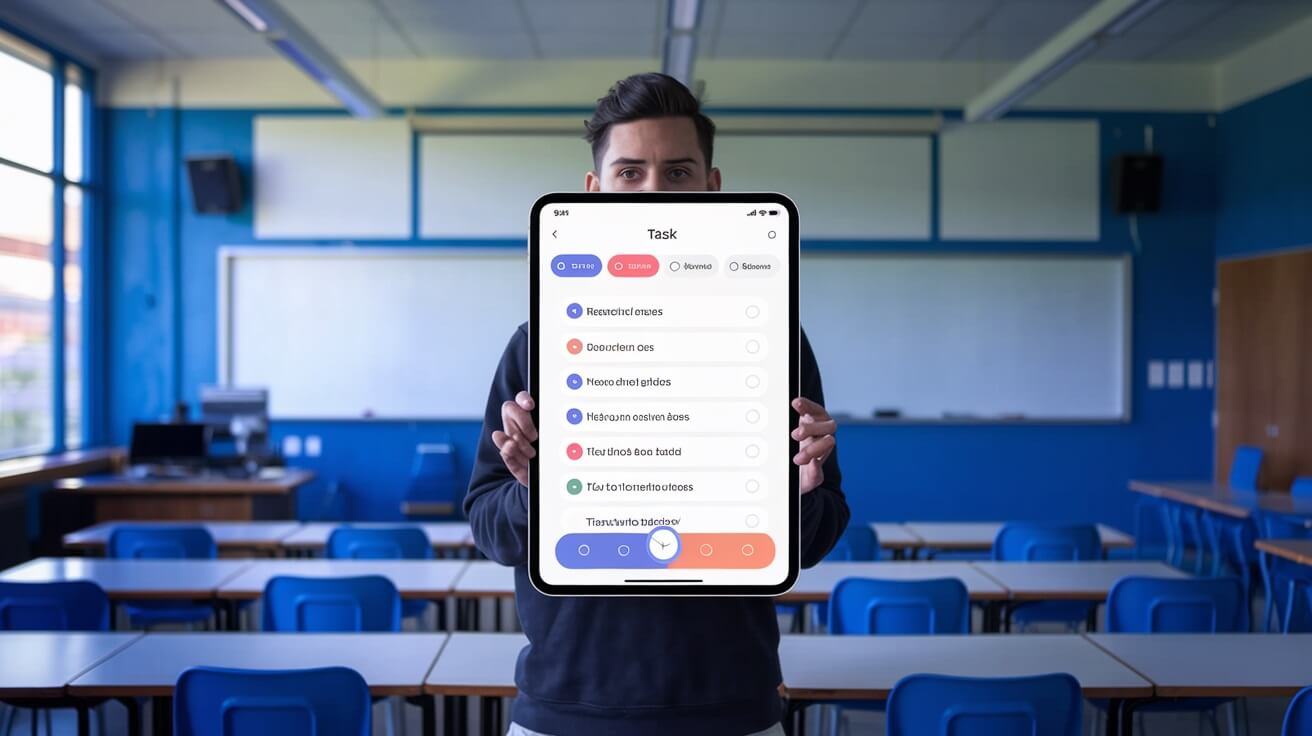
Boost Your Productivity: How to Make the Most of Study Apps
Do you ever feel like there’s insufficient time to tackle your studies? Or maybe you sit down to focus, only to find yourself scrolling through social media hours later? If you nodded along, you’re not alone. Staying productive in today’s highly digital environment can be a challenge. But here’s the good news: the same technology that distracts us can also help us.
Enter study apps—tools designed to help you organize, focus, and manage your learning more effectively. These apps are more than just convenient; they can be game-changers in approaching your academic or professional goals.
This article provides a practical guide to using study apps to enhance productivity and achieve academic or professional goals. It explores how these digital tools can help with organization, time management, and focus, offering insights into popular apps like Notion, Quizlet, Forest, and Evernote.
You’ll learn to select the right app for your needs, integrate it into your routine, and avoid common pitfalls. With real-life examples, actionable tips, and strategies to balance digital tools with traditional methods, this article ensures you have everything needed to maximize your learning efficiency and stay consistently productive.
What Are Study Apps?
Study apps are innovative digital tools created to streamline and improve the way we approach learning and productivity. These apps are designed to address various needs, including managing your time effectively, organizing notes, tracking tasks, creating flashcards, and maintaining focus. Studying apps can be a game-changer if you’re a student preparing for exams, a professional pursuing certifications, or simply someone aiming to stay organized.
These apps are virtual study companions, helping you stay on top of your goals efficiently and quickly. For example, apps like Notion provide a centralized space for notes and tasks, while Quizlet enables you to memorize key concepts through engaging flashcards. Tools like Forest encourage focus by gamifying your study sessions, making productivity feel rewarding.
By leveraging these apps, you can reduce stress, improve organization, and optimize your learning experience. They adapt to your needs, allowing you to focus on what truly matters—achieving your academic or professional aspirations.

Popular Study Apps and Their Features
There’s no one-size-fits-all when it comes to study apps. The ideal option varies based on your requirements. Here are a few popular options and what they offer:
-
Notion: A comprehensive tool for note-taking, task management, and project organization. It’s perfect for creating a centralized workspace.
-
Quizlet: Ideal for creating and using flashcards. It’s beneficial for language learners or anyone studying for exams.
-
Forest: A focus timer that gamifies productivity. As you stay focused, a virtual tree grows, creating a satisfying visual reminder of your efforts.
-
Evernote: A robust digital notebook that allows you to organize and search your notes effortlessly.
These apps are designed to make learning more interactive and manageable. Whether you’re preparing for exams or juggling work and studies, there’s likely an app tailored to your needs.
Why Use Study Apps for Productivity?
Proven Benefits
Study apps have been proven to improve productivity in various ways. A study by EdTech Magazine revealed that students using these tools report saving 40% of their time on organizing and managing tasks. Here’s why:
-
Organization Made Simple: Apps like Notion help you keep track of assignments, deadlines, and notes all in one place.
-
Efficient Learning Tools like Quizlet make reviewing and retaining information accessible by using flashcards and games.
-
Eliminating Distractions: Apps like Forest turn staying focused into a rewarding challenge.
Real-Life Success Stories
Meet Ravi, a college student who struggled with procrastination. He discovered Forest and started using it to block distractions during study sessions. Not only did his focus improve, but he also began completing assignments ahead of deadlines. Another example is Mia, who aced her medical exams using Quizlet to create custom flashcards for anatomy terms. These stories prove that the right tools can genuinely transform your study habits.
How to Choose the Right Study App
Finding one that fits your needs is the key to getting the most out of study apps. Here’s how:
Key Features to Look For
-
User-Friendliness: A complicated interface can be counterproductive. Look for apps that are intuitive and easy to use.
-
Customizability: Customizing the app to suit your preferences can enhance its effectiveness.
-
Specific Tools: Depending on your goals, you might need features like flashcards, timers, or collaboration tools.
-
Offline Functionality: Apps like Evernote allow you to access your materials even when you’re not connected to the internet.
Comparing Popular Apps
| App | Features | Best For |
|---|---|---|
| Notion | Task management, notes | Comprehensive organization |
| Quizlet | Flashcards | Memorization and test prep |
| Forest | Focus timer | Eliminating distractions |
| Evernote | Digital notebook | Detailed note-taking |
Evaluating your needs and comparing app features will help you make a well-informed choice.
How to Use Study Apps Effectively
Once you’ve chosen the right app, the next step is integrating it into your routine. Here’s a practical guide:
Step-by-Step Guide
-
Identify Your Goals: Decide what you want—better time management, focused study sessions, or streamlined notes.
-
Start Small: Begin by using just one or two app features. For instance, use Forest to time your study sessions or Notion to organize your weekly tasks.
-
Set Clear Goals: Define measurable outcomes, such as “Review three sets of flashcards daily” or “Complete two Pomodoro cycles.”
-
Evaluate and Adjust: After a week, review how the app is helping and tweak your approach if needed.
Avoiding Common Pitfalls
-
Overcomplicating Setup: Spending hours customizing templates can save time. Start with simple setups.
-
App Overload: Using too many apps simultaneously can be overwhelming. Stick to one or two that meet your core needs.
Best Practices for Maximizing Productivity with Study Apps
Combine Apps with Traditional Study Methods
While study apps are beneficial, they shouldn’t replace traditional methods entirely. For example:
-
Use Quizlet for flashcards, but write summaries in a notebook for deeper understanding.
-
Pair Forest with offline reading to maximize focus.
Time Management Techniques
-
The Pomodoro Technique: Apps like Forest can help you implement this method, which involves studying in 25-minute intervals followed by short breaks.
-
Task Prioritization: Use Notion or Evernote to list tasks by priority, ensuring you focus on what’s most important first.
Challenges and How to Overcome Them
Staying Consistent
Building a habit of using study apps requires consistency. Here’s how:
-
Set daily reminders to use the app.
-
Celebrate your progress by treating yourself when you hit milestones, such as using the app consistently for a week.
Avoiding Overwhelm
-
Limit the number of apps you use to avoid clutter.
-
Regularly review and organize your app data to keep things manageable.
Key Takeaways
-
Study apps can significantly enhance productivity by simplifying tasks and improving focus.
-
Select apps that fit your needs and slowly incorporate them into your daily routine.
-
Balance digital tools with traditional methods for a well-rounded approach to learning.
FAQs
What are the best study apps for students?
Notion, Quizlet, Forest, and Evernote are some of the top choices for students.
How do study apps improve productivity?
They simplify organization, enhance focus, and provide tools like flashcards and timers to make learning more efficient.
Can study apps replace traditional methods?
While helpful, they work best when combined with conventional study techniques like handwritten notes.
Do study apps work offline?
Yes, apps like Evernote and Notion offer offline functionality.
How can I stay consistent with using study apps?
Set reminders, define goals, and track your progress to build a habit.
Conclusion
Study apps are potent allies in your journey toward better productivity and learning. Selecting the right app, using it effectively, and adopting best practices can help you achieve greater focus and better organization.
Remember, it’s not about the tools but how you use them. Start small, stay consistent, and watch your productivity soar.
Which study app will you try first? Let us know how it transforms your study routine!
Study Tips Students




